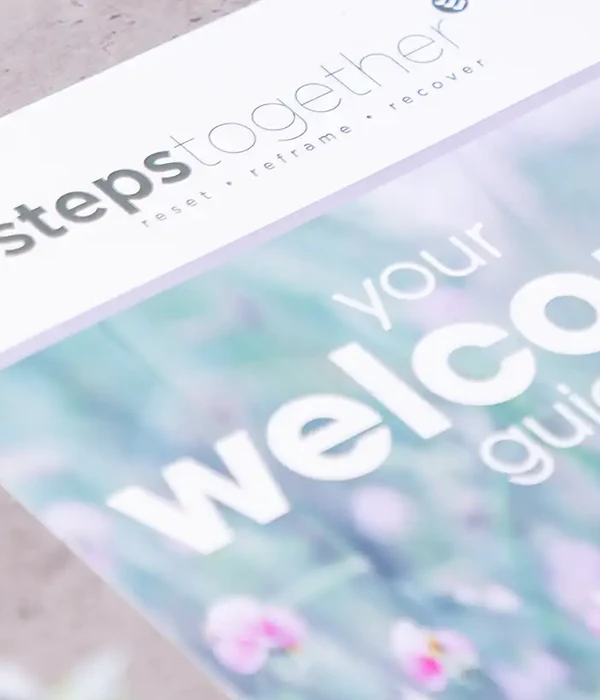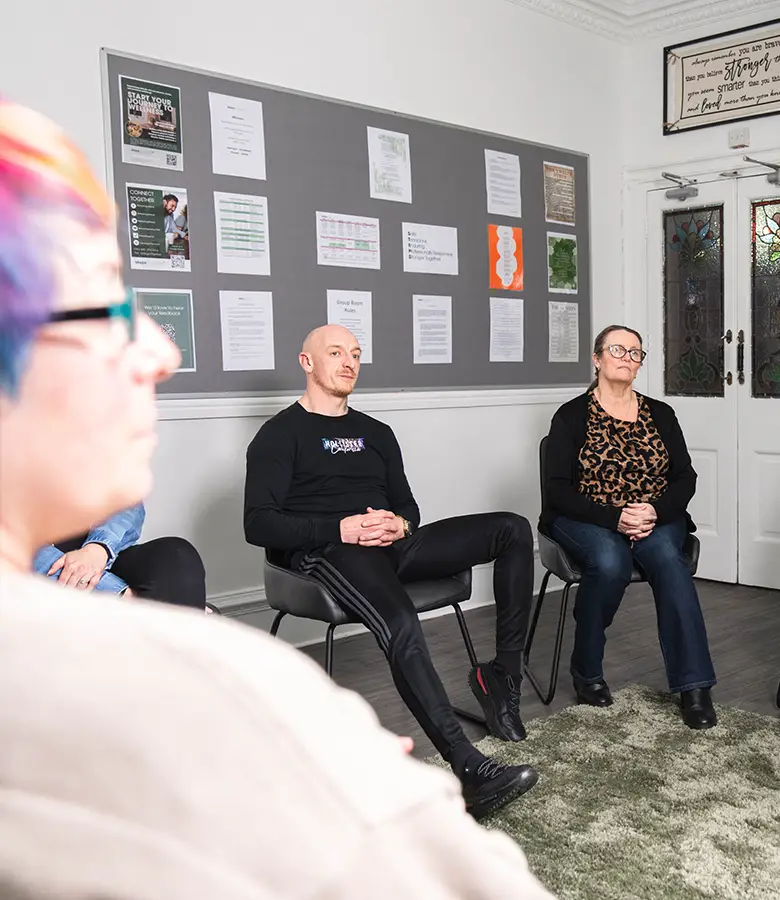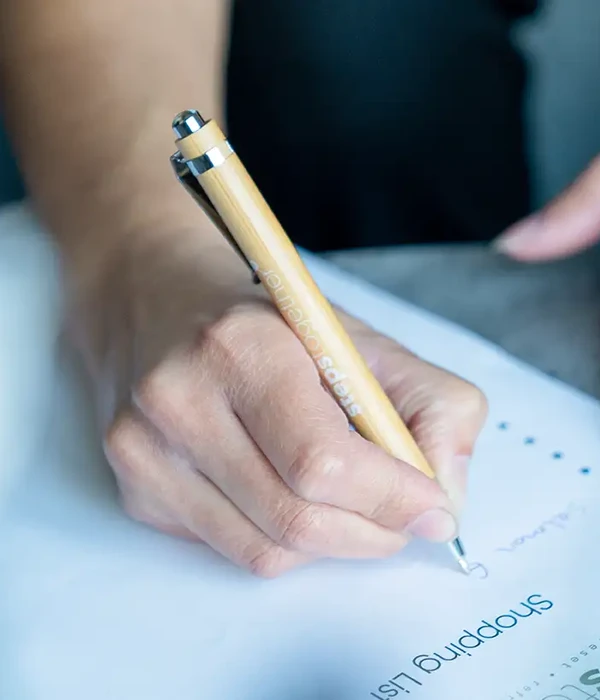Diazepam Addiction Treatment
Diazepam is a prescription drug often used to treat anxiety, muscle spasms, and seizures. While effective for short-term use, diazepam can be addictive and can lead to a substance use disorder. When misused, benzodiazepines can be dangerous.
Benzodiazepine addiction treatment includes medically supervised detox, counselling, and a range of therapies to address both physical and psychological needs. With the right diazepam addiction treatment, it is possible to break free from dependency and improve your overall quality of life.

Take the First Step Towards Recovery
Steps Together offers personalised support and proven treatments, providing the care, guidance and encouragement you need to move forward with confidence and build a healthier future.

Understanding Diazepam Addiction
Diazepam addiction is a condition where a person becomes dependent on the regular use of diazepam, a prescription medication in the benzodiazepine family. Often developing over time, addiction can result from prolonged or inappropriate use, even when initially taken as prescribed.
The body and brain become dependent on the drug and rely on it to function normally, leading to cravings and continued use despite negative consequences. Professional treatment is usually needed to safely manage withdrawal and address the psychological aspects of the addiction.
What Is Diazepam and How Does It Work?
Diazepam is a type of benzodiazepine. This class of medication helps calm the brain by boosting the effects of gamma-aminobutyric acid (GABA), a chemical that slows down activity in the central nervous system.
You could be prescribed medications like diazepam for anxiety, muscle spasms, or sleep issues. While it can be very effective, diazepam works by reducing signals between nerves, which makes you feel relaxed or sleepy.


Why Professional Treatment Matters
Trying to manage diazepam dependence alone can be unsafe and overwhelming. Professional care provides medical supervision during detox, emotional support through therapy, and practical strategies for rebuilding daily life.
Having a dedicated team ensures that recovery isn’t just about stopping the drug, but about creating a healthier and more sustainable future.
Diazepam Addiction Treatment Options
A diazepam addiction treatment programme is usually focused on breaking physical dependence and supporting your mental and emotional recovery. Treatment plans are tailored, with various therapies and supports to help you regain control and reduce the risk of relapse.
Inpatient and Outpatient Programmes
Inpatient treatment programmes provide a structured setting where you stay at an addiction rehab centre while receiving care. Residential treatment can be beneficial if your addiction is severe or if you have tried and struggled to stop on your own.
Outpatient treatment services allow you to live at home while attending scheduled appointments. This approach suits you if your addiction is less severe. Outpatient programmes may involve visiting a clinic several times weekly for therapy, drug testing, and health monitoring.
Individual Counselling
Individual counselling gives you one-to-one support from an addiction specialist during your recovery journey. Sessions may explore your reasons behind drug use, past trauma, anxiety, or other mental health concerns.
Meetings focus on building self-esteem and improving coping skills. With regular individual therapy, you receive confidential feedback and guidance on how to deal with setbacks, helping you make steady progress during and after your drug rehab.
Behavioural Therapies
Evidence-based methods such as cognitive behavioural therapy (CBT) help you notice and change unhelpful thoughts and actions linked to drug use. You practise new skills, like coping with stress or refusing offers of drugs.
Dialectical behaviour therapy (DBT) is used if your addiction fits with mood swings or self-harm. DBT blends elements of CBT with mindfulness and emotional regulation skills. These treatments focus on long-term recovery by helping you tackle both the addiction itself and the problems in daily life that may trigger use.
Group Therapy and Peer Support
Group therapy brings you together with others experiencing similar challenges. Each session is led by a trained therapist, allowing you to listen, share, and learn from other people’s stories.
Support groups like Narcotics Anonymous and other peer-led meetings add another layer of encouragement. These communities give you a chance to speak honestly, celebrate progress, and ask for help when you need it from other people recovering from diazepam use.
Other addiction treatment services our rehab centre offers

Long-Term Recovery
Relapse prevention starts with clear planning and self-monitoring. You should work with professionals to create a relapse prevention plan that includes identifying warning signs and outlining steps to follow if cravings or risky situations occur.
Routine check-ins with healthcare providers are often essential. Keeping a journal, tracking your mood, and sticking to a schedule help you spot patterns early. It is important to stay informed about personal triggers and high-risk situations, such as being around people you once used drugs with or experiencing high stress.
Aftercare Programmes and Managing Mental Health
Aftercare is a planned programme of care that begins after initial treatment ends. It may include regular therapy, group meetings, and check-ins with addiction specialists. Staying engaged in aftercare reduces the risk of returning to old habits. Many aftercare programmes will focus on life skills, job training, or family support.
Good mental health care is vital to addiction recovery. If you struggle with anxiety, depression, or insomnia, talk to a mental health professional. Medication, therapy, or both may be recommended. Regular exercise, healthy eating, and good sleep habits support recovery and improve your mood.

Diazepam Detox
Diazepam withdrawal can lead to a wide range of symptoms. Common early signs include anxiety, insomnia, irritability, and tremors. Some people also experience sweating, muscle pain, confusion, or headaches. In rare cases, you may have seizures or hallucinations.
Stopping diazepam suddenly is risky, especially if you have been using it for a long time or at high doses. Sudden withdrawal can cause severe symptoms, including seizures, confusion, and psychosis. These risks go up if you have a history of epilepsy or are also withdrawing from alcohol.
Medical detoxification helps you come off diazepam in a safe, controlled setting. Doctors and nurses monitor you for withdrawal symptoms and watch for problems like tremors or seizures. Medical detox often uses a tapering schedule, meaning your dose is slowly reduced over weeks or months.
Signs and Effects of Diazepam Abuse
Diazepam abuse has clear signs that affect both your body and mind. If you notice changes in your physical health, mood, or behaviour, these can be early warnings of addiction and its risks.
Physical Symptoms of Addiction
Physical signs are often the first to appear when you abuse diazepam. You may feel drowsy or sedated, with less control over your coordination and movements. Slurred speech is common, and you may also notice blurred vision.
Muscle weakness or tremors can develop over time, making daily tasks harder. Your reflexes may slow, and you could experience problems such as headaches or nausea. Some people develop tolerance quickly, needing higher doses to get the same effect, which raises the risk of overdose.
Short-term and Long-term Health Risks
Abusing diazepam and drugs like Valium has both short-term and long-term dangers. Short-term risks include loss of coordination, confusion, drowsiness, and a higher chance of accidents or injuries. An overdose is possible if you take too much, especially with other sedatives or alcohol.
Long-term health risks are more severe. You may develop chronic insomnia, long-lasting memory loss, or ongoing problems with thinking clearly. Physical dependency can cause lasting issues in your muscles, such as spasms or ongoing weakness. Tolerance builds quickly, pushing you to use even more to get relief from anxiety or stress.
Psychological and Behavioural Warning Signs
Diazepam abuse not only affects your body, but it can also cause strong changes in mood and thinking. Feeling anxious or agitated is common, as well as sudden mood swings and irritability.
Some people may seem detached or less interested in their usual activities. Memory problems and confusion become more obvious as the addiction continues. Risky actions, spending time with different friends, or ignoring responsibilities can be signs that something is wrong.

Diazepam Rehab Treatment is Available
For many people, an addiction to diazepam can feel overwhelming and difficult to overcome. However, recovery is possible with the right support and treatment. At Steps Together, we offer world-class care tailored to each individual’s needs, helping you or your loved one break free from substance misuse.
At Steps Together, our team provides diazepam addiction treatment in a compassionate environment with evidence-based therapies, medical support, and long-term recovery planning. Taking the first step toward healing starts with reaching out, and we’re here to help you move forward.
Frequently Asked Questions
What are the first steps in seeking treatment for benzodiazepine dependence?
The first step is to consult your GP or a healthcare professional. They can assess your condition and recommend a medically supervised detox programme. Early intervention helps prevent complications and ensures you receive the right support from the start.
Are there any approved medications to assist with diazepam withdrawal symptoms?
During detox, your doctor may use long-acting benzodiazepines to stabilise your symptoms before tapering. Other medicines might help with symptoms like anxiety or insomnia. However, there are no specific approved medications solely for diazepam withdrawal.
Can you describe the long-term recovery process and support for those overcoming a dependence on tranquilisers?
Long-term recovery involves ongoing support, like counselling, peer groups, and regular medical check-ups. You may join aftercare or alumni groups to share your progress and challenges.
How does one safely withdraw from diazepam under medical supervision?
Withdrawal should always be done under medical supervision to minimise risk. A slow, controlled tapering of your dose is usually recommended. This helps reduce withdrawal symptoms and prevents severe complications such as seizures.
What role do therapy and counselling play in recovery from sedative addiction?
Therapy and counselling help you address the emotional and psychological reasons behind drug use. Individual or group therapy sessions teach new coping skills and stress management.
What lifestyle changes and coping strategies are recommended for sustained sobriety after diazepam abuse?
Maintaining sobriety often means rebuilding daily routines, improving sleep habits, and engaging in physical exercise. You should avoid triggers, reduce stress, and develop new hobbies.





